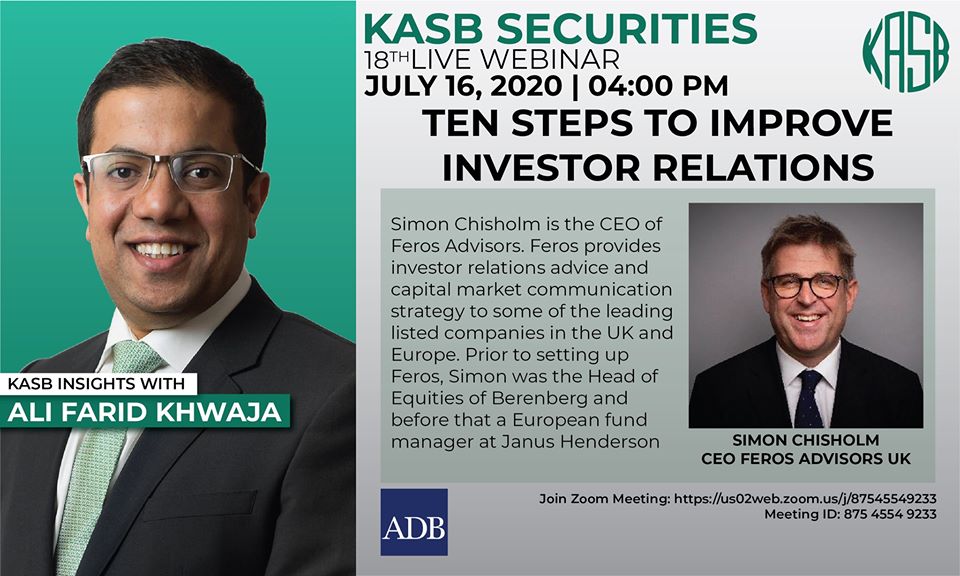- From a corporate perspective, the higher management needs to be very sure of the reason why the business exists; that is, what needs is it servicing and how exactly does it create value.
- If corporates can better communicate and explain to fund managers, in layman terms, exactly what it is that differentiates them in terms of value addition, generally the investor perception of that company’s shares will improve.
- Corporates should not be fixated with the idea of achieving a higher share price and/or raising the largest possible amount of capital; they are both only outcomes of the process that these companies undergo.
- The problem with share price focus is that it raises investors’ expectations to unrealistic levels, and puts off fund managers from buying shares. Obsessing over persistently high share prices generally does not end well for companies.
- The shareholder structure needs to be diversified for companies. Capital/Debt owners are a risk for the business, and concentrated risk is invariably a bad thing.
- Having acute knowledge of why the business exists and what it wants to achieve may seemingly be fairly straightforward broad-strategy issues, but it is just as important for it to be reflected in the communications with shareholders.
- Companies should actively seek to maintain consistent communication, internally and externally – marketing, sales, and investors.
- Companies should disclose enough information about the methods of calculating key internal metrics that there is no material inconsistency between the investors’ expectations and what the business is able to deliver. Businesses ought to help investors base their investment decisions on calculations that are consistent with how the business crunches the numbers internally.
- It is very important that a company’s advisors are culturally aligned with the business itself.
- Having large institutional investors as shareholders might not always serve a business well. There needs to be a certain degree of diversity in the pool of shareholders. The sources of capital for a company’s shareholders need to be different so that the business is not solely exposed to a singular risk.
- Fund managers’ thought process going into a meeting usually is ‘why should I not buy this company’s shares. They are only putting skin in the game if they invest. Therefore, companies need to identify what factors might put off a fund manager from purchasing their shares, rather than just focusing on the factors that might make them supposedly more attractive.
- During presentations, the higher management ought to proactively own up to some of the No’s or potentially problematic aspects of investing in the company. It is not advisable to wait to be asked questions about said problematic aspects.
- There is no such thing as either a ‘good’ or ‘bad’ equity. Company’s shares are either ‘expensive’ or ‘cheap’, priced relative to the degree perceived risk associated with a business. If a company wishes to improve its rating, it needs to get investors to better understand the risks associated with its equity.
- Investors do not like surprises – even good ones. Under-promising and over-delivering is not a sustainable strategy in the long-run. It inflates expectations, and investors will generally start expecting the business to generate higher returns than originally forecasted.
- Company management ought to ask fund managers/investors their opinions in broad terms, sort of in the multiple-choice format. It helps push back some of the reservations they may have about buying-in to the company. And people generally like it when they are asked to opine on important matters. It may help with the sales aspect of the deal too.
- When meeting/presenting to fund managers/investors, management ought to be careful not to let one person ‘become the company’. It may be off-putting for investors, or even a signpost of some governance-related issues if just CEO or the owner of the company takes up bulk of the presentation, and the divisional heads do not get the opportunity to provide their input.
- The notion that in order to control a company, one has to hold 51% of the equity is false. A 25% stake should be enough to help achieve that.
- In case there are ever any doubts as to the authenticity of a company’s financials, fall back onto two things that cannot lie: 1) how cash moves within the business and 2) the amount of tax paid in cash.
- The best way to evaluate the directors’ performance in terms of stewardship of the company is to look at the staff turnover ratio; the lower it is, the better.
- Investor Relations hinge on the management being able to identify and communicate their key strategic competitive edge in terms of either being ‘better’ or ‘cheaper’.
- During uncertain times, such as the ones we are enduring right now with the COVID-19 pandemic, it is very important to be upfront and honest with investors about the limitations in forecasting ability. Saying ‘I don’t know’ is a perfectly acceptable answer, which is likely to fetch integrity points as well.
- With regards to ESG initiatives, investors are currently predominantly interested in the governance aspect of affairs. In most funds, they will have a dedicated resource to evaluate the company on the ESG (especially, on the governance aspect), and if a company fails to satisfy the governance criteria it may face divestiture despite exhibiting strong financial performance.

